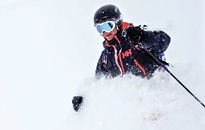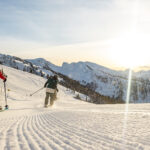Dr. John’s E.R.
Although low-carbohydrate/ketogenic and intermittent-fasting diets are popular as a weight-loss method, especially with the Hollywood set, the available science indicates that these diets may impair ski performance and recovery.
A 2010 study of competitors in a two-day ski mountaineering competition showed that the best performances correlated with higher complex-carbohydrate (slow-burning) intake along with adequate protein. During this study, athletes could only eat the food in their packs. Blood levels of markers that reflect muscle damage and inflammation were also elevated in athletes with low levels of carbohydrate intake. This meant that next-day muscle soreness and recovery was also better in the group that ate adequate complex carbohydrates and protein.
For many years, I was guilty of eating the wrong type of food on ski trips. Frosted Flakes and coffee for breakfast, poutine and beer for lunch, nachos and more beer at après. Nancy Greene sold me on my hill snack: a Mars bar.
But the sugary cereal was apparently only helping for the first run, leaving me burning ketones for the rest of the morning. A better choice would have been oatmeal with fruit and nuts or eggs with whole grain toast. Thankfully coffee, a mild diuretic, still provides decent hydration. And despite the popularity of intermittent fasting as a method for weight loss, skipping breakfast on a ski day is not recommended by the experts.
Truthfully, I’m not likely to give up all of my favourite ski rituals like fondue, beer and pizza. But if I can make small changes to my ski-day diet, like having frequent small snacks of complex carbs with a mix of protein (trail mix, granola), I may be able to keep up with my kids for a few more years.

Dr. John Foote is an emergency room physician at Toronto’s Mount Sinai Hospital and a Devil’s Glen skier.



